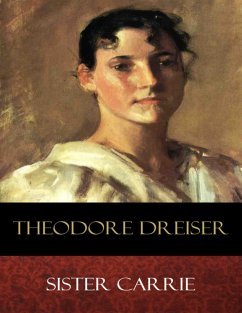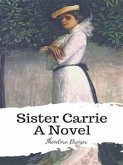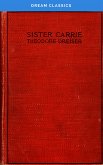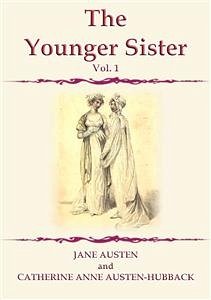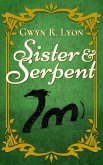Sister Carrie (1900) is a novel by Theodore Dreiser about a young country girl who moves to the big city where she starts realizing her own American Dream, first as a mistress to men that she perceives as superior, and later becoming a famous actress. It has been called the "greatest of all American urban novels."
Dissatisfied with life in her rural Wisconsin home, 18-year-old Caroline "Sister Carrie" Meeber takes the train to Chicago, where her older sister Minnie, and Minnie's husband, Sven Hanson, have agreed to take her in. On the train, Carrie meets Charles Drouet, a traveling salesman, who is attracted to her because of her simple beauty and unspoiled manner. They exchange contact information, but upon discovering the "steady round of toil" and somber atmosphere at her sister's flat, she writes to Drouet and discourages him from calling on her there.
Carrie soon embarks on a quest for work to pay rent to her sister and her husband, and takes a job running a machine in a shoe factory. Before long, however, she is shocked by the coarse manners of both the male and female factory workers, and the physical demands of the job, as well as the squalid factory conditions, begin to take their toll. She also senses Minnie and Sven's disapproval of her interest in Chicago's recreational opportunities, particularly the theater. One day, after an illness that costs her her job, she encounters Drouet on a downtown street. Once again taken by her beauty, and moved by her poverty, he encourages her to dine with him, where, over sirloin and asparagus, he persuades her to leave her sister and move in with him. To press his case, he slips Carrie two ten dollar bills, opening a vista of material possibilities to her. The next day, he rebuffs her feeble attempts to return the money, taking her shopping at a Chicago department store and securing a jacket she covets and some shoes. That night, she writes a good-bye note to Minnie and moves in with Drouet.
Drouet installs her in a much larger apartment, and their relationship intensifies as Minnie dreams about her sister's fall from innocence. She acquires a sophisticated wardrobe and, through his offhand comments about attractive women, sheds her provincial mannerisms, even as she struggles with the moral implications of being a kept woman. By the time Drouet introduces Carrie to George Hurstwood, the manager of Fitzgerald and Moy's – a respectable bar that Drouet describes as a "way-up, swell place" – her material appearance has improved considerably. Hurstwood, unhappy with and distant from his social-climbing wife and children, instantly becomes infatuated with Carrie's youth and beauty, and before long they start an affair, communicating and meeting secretly in the expanding, anonymous city.
Theodore Herman Albert Dreiser was an American novelist and journalist. He pioneered the naturalist school and is known for portraying characters whose value lies not in their moral code, but in their persistence against all obstacles, and literary situations that more closely resemble studies of nature than tales of choice and agency.
Dissatisfied with life in her rural Wisconsin home, 18-year-old Caroline "Sister Carrie" Meeber takes the train to Chicago, where her older sister Minnie, and Minnie's husband, Sven Hanson, have agreed to take her in. On the train, Carrie meets Charles Drouet, a traveling salesman, who is attracted to her because of her simple beauty and unspoiled manner. They exchange contact information, but upon discovering the "steady round of toil" and somber atmosphere at her sister's flat, she writes to Drouet and discourages him from calling on her there.
Carrie soon embarks on a quest for work to pay rent to her sister and her husband, and takes a job running a machine in a shoe factory. Before long, however, she is shocked by the coarse manners of both the male and female factory workers, and the physical demands of the job, as well as the squalid factory conditions, begin to take their toll. She also senses Minnie and Sven's disapproval of her interest in Chicago's recreational opportunities, particularly the theater. One day, after an illness that costs her her job, she encounters Drouet on a downtown street. Once again taken by her beauty, and moved by her poverty, he encourages her to dine with him, where, over sirloin and asparagus, he persuades her to leave her sister and move in with him. To press his case, he slips Carrie two ten dollar bills, opening a vista of material possibilities to her. The next day, he rebuffs her feeble attempts to return the money, taking her shopping at a Chicago department store and securing a jacket she covets and some shoes. That night, she writes a good-bye note to Minnie and moves in with Drouet.
Drouet installs her in a much larger apartment, and their relationship intensifies as Minnie dreams about her sister's fall from innocence. She acquires a sophisticated wardrobe and, through his offhand comments about attractive women, sheds her provincial mannerisms, even as she struggles with the moral implications of being a kept woman. By the time Drouet introduces Carrie to George Hurstwood, the manager of Fitzgerald and Moy's – a respectable bar that Drouet describes as a "way-up, swell place" – her material appearance has improved considerably. Hurstwood, unhappy with and distant from his social-climbing wife and children, instantly becomes infatuated with Carrie's youth and beauty, and before long they start an affair, communicating and meeting secretly in the expanding, anonymous city.
Theodore Herman Albert Dreiser was an American novelist and journalist. He pioneered the naturalist school and is known for portraying characters whose value lies not in their moral code, but in their persistence against all obstacles, and literary situations that more closely resemble studies of nature than tales of choice and agency.

